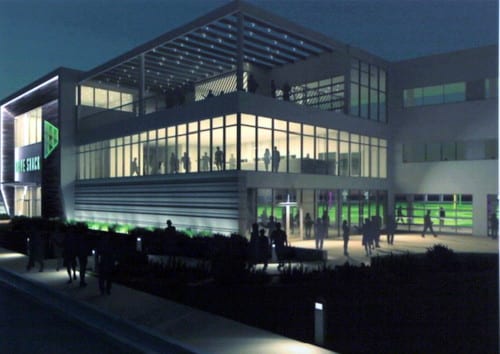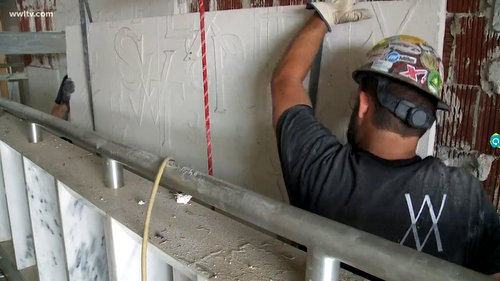
A rendering of the Driveshack golf facility under consideration at the former Times-Picayune site at Howard Avenue.
The sales tax at the new Drive Shack golfing-entertainment complex that is proposed to replace the former Times-Picayune building on Howard Avenue should be 2 cents higher than in the rest of New Orleans, in part to pay for the costs of redeveloping the site, the developers told City Council members on Tuesday.
The developers are also seeking to have the property tax increased gradually as the development grows, rather than all at once, in order to make the costs of business there more predictable, they said. Both requests, they said, will only allow them to dip into new tax money that will be created at Drive Shack, rather than reducing any tax flow already into the city.
“We’re not asking for an incentive that would take any of the city’s money,” attorney Michael Sherman told the City Council’s economic development committee on Tuesday.

Workers begin removing the murals from the former Times-Picayune building on Howard Avenue in preparation for its expected demolition. (read more from WWL-TV)
Specifically, the development group is asking the city to create a new “Broad Street Sports Entertainment and Dining Economic Development District” that has the ability to raise the sales tax from 9.45 percent to 11.45 percent around the Drive Shack location. That request has been pending before the City Council for several weeks, and expected to be heard at Thursday’s meeting.
The request, Sherman said, is way to help the company offset its development costs without either reducing the tax revenue flowing into the city or impacting New Orleanians’ other purchases in their daily lives. It simply increases the tax on Drive Shack customers alone.
“Drive Shack doesn’t sell groceries. Drive Shack isn’t providing you the necessities of life. It’s entertainment,” Sherman said. “Drive Shack believed they would be able to withstand an additional sales tax on their customers up to 2 percent if they could share in those additional sales tax proceeds with the city of New Orleans.”
The majority of that increase, 1.5 cents on the dollar, would go to Drive Shack to help offset $6 million in costs of demolition, environmental remediation and other issues that would not be present if they were developing in a suburban plot of open land, Sherman said. The remaining 0.5 cent increase would still flow to the city to help with infrastructure improvements around the site.
“Much of this will look very similar to Magnolia Marketplace,” said Miles Granderson of Sherman Strategies. Magnolia Marketplace in Central City was allowed to create a 1-percent tax increase at its site in 2013 to help pay for $2.3 million in site work over an anticipated 15-year period.
Further, if the city agreed to expand Howard Avenue into downtown, creating a new entrance to Drive Shack from the Central Business District and French Quarter, then the developers would split the sales-tax increase with the city evenly to help pay for that project.
“The Howard Avenue corridor is isolated from downtown and many parts of the city based upon railroad tracks and a fence, and a Howard Avenue extension that has not yet been complete,” Sherman said.
Separately, the group is also asking the city’s Industrial Development Board to create a defined schedule of expected property-tax payments over the next 12 years. Instead of the site being reassessed intermittently as it grows — which could result in unexpected increases — the developers want to plan out the increases over that period, which Granderson said will still likely result in $2.5 million more in property-tax payments to the city than the undeveloped site would.
The incentives are needed, the developers said, because New Orleans is a smaller market than the others in Drive Shack’s first 10 locations. Its construction will help stem the tide of “family friendly” entertainment moving into the suburbs, and keep visitors with families in the city, they said.
“It’s a world class entertainment company,” Sherman said. “Its goal is to put a golf club in every person’s hand. It is where technology meets a driving range with food and beverage, music and entertainment.”
The incentives also provide an additional benefit to city government — giving it more control over how the Drive Shack development proceeds. The city’s goals for hiring of minority-owned businesses during construction, for example, can be made into contractual requirements with penalties if Drive Shack fails to meet them.
Likewise, Drive Shack’s operation is expected to create 300 jobs, full time and part-time, Sherman said, and the city can tie requirements for local hiring into the tax incentives, again with penalties if they are not met, he said.
The Economic Development Committee had just heard a discussion of disadvantaged businesses, and retired Maj. Tracy Riley, now a businesswoman, questioned whether Drive Shack should receive any additional funding through tax mechanisms.
“Our community will not be able to afford to enjoy whatever products and services you’re going to be providing,” Riley said. “So this very much feels like the same types of projects that we have seen popping up around New Orleans that is good for non-African American communities and business, and continues to exclude the base of this population.”
The proposed Drive Shack redevelopment is a complex project that will require city permission at multiple points, such as the zoning and the demolition, and the developers suggested that they will still be back before the council four or five times as it moves forward. The first step, expected to be heard Thursday, is the creation of the development district, which would then have the power to raise the taxes on the site.
Council members Joe Giarrusso III and Jay H. Banks both requested more detail on the financial projections for the taxes before moving forward. Banks said that he hopes the hiring requirements will be as strong as possible, suggesting Drive Shack partner with nearby high schools such as Booker T. Washington to seek out employees from the neighborhood.
“I would hope that of these 300 jobs, 299 are local hires,” Banks said.
See full video of the Drive Shack presentation below: